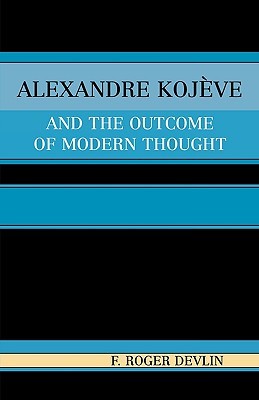
- We will send in 10–14 business days.
- Author: Roger F Devlin
- Publisher: University Press of America
- ISBN-10: 0761829598
- ISBN-13: 9780761829591
- Format: 14.2 x 22.1 x 1.4 cm, softcover
- Language: English
- SAVE -10% with code: EXTRA
Alexandre Kojeve and the Outcome of Modern Thought (e-book) (used book) | bookbook.eu
Reviews
Description
The brilliant Hegelian philosopher, Alexandre Kojève, remains among the most enigmatic figures of twentieth-century philosophy. Although a highly systematic thinker, he left no systematic presentation of his thought. His most important book deceptively appears to be a mere secondary work on Hegel's Phenomenology of the Spirit. Most of his nine books and many essays have not even appeared in English. This brief yet lucid study takes the reader to the heart of Kojève's philosophical project. Author F. Roger Devlin brings him into dialogue with Plato, Aristotle, Hobbes and Hegel, incidentally helping elucidate their thought by comparison with Kojève's own. Kojève was not a commentator on Hegel whose success might be measured by fidelity to the master, but rather a philosopher who, starting from Hegelian premises, arrived at a system of thought that is the logical outcome of modern philosophy. This system, which Devlin names rational historicism, is the preeminently modern response to the basic question of philosophy since the time of Socrates: What is man?
EXTRA 10 % discount with code: EXTRA
The promotion ends in 16d.06:39:59
The discount code is valid when purchasing from 10 €. Discounts do not stack.
- Author: Roger F Devlin
- Publisher: University Press of America
- ISBN-10: 0761829598
- ISBN-13: 9780761829591
- Format: 14.2 x 22.1 x 1.4 cm, softcover
- Language: English English
The brilliant Hegelian philosopher, Alexandre Kojève, remains among the most enigmatic figures of twentieth-century philosophy. Although a highly systematic thinker, he left no systematic presentation of his thought. His most important book deceptively appears to be a mere secondary work on Hegel's Phenomenology of the Spirit. Most of his nine books and many essays have not even appeared in English. This brief yet lucid study takes the reader to the heart of Kojève's philosophical project. Author F. Roger Devlin brings him into dialogue with Plato, Aristotle, Hobbes and Hegel, incidentally helping elucidate their thought by comparison with Kojève's own. Kojève was not a commentator on Hegel whose success might be measured by fidelity to the master, but rather a philosopher who, starting from Hegelian premises, arrived at a system of thought that is the logical outcome of modern philosophy. This system, which Devlin names rational historicism, is the preeminently modern response to the basic question of philosophy since the time of Socrates: What is man?


Reviews